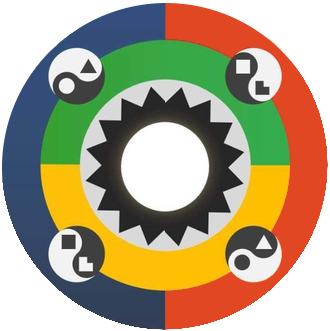Why Socionics is Better than the MBTI?
In this community, we practise Socionics, not MBTI.
To the casual observer, this may generate confusion, as both operate on 16 types and both are inspired by the work of Carl Jung. Why then do we use the former and not the latter?
The answer, in short, is that Socionics is just better than MBTI, in almost every conceivable way.
It is, admittedly, more complex than MBTI, and so less accessible, but that complexity reaps rich rewards in terms of how much the theory can explain interpersonal differences.
A key feature of typology systems is that they typically rely on dichotomies to define what each type is. In the MBTI, 4 dichotomies are given: Extraverted vs. Introverted, Sensing vs iNtuitive, Thinking vs. Feeling, and Judging vs. Perceiving.
But here's the issue: 4 dichotomies are the bare minimum required to create 16 types. 4 gives you only an partial, obscured view of each type and how it differs from the others. Mathematically-speaking, the number of dichotomies must always equal the number of entities being defined minus one. Therefore, a theory of sixteen types MUST have 15 dichotomies, not 4. Therefore, in focusing on only those 4, MBTI severely limits its own potential.
Not only this, but when grappling with some of the complexity inherent to there being 16 types, the MBTI has had to rely on just those 4 dichotomies to explain them, meaning a lot of different ideas have been mixed together, making the theory incoherent. It is like a man learning to swim without arms and only one leg. With more dichotomies, a typology can separate out concepts that ought not to be mixed, allowing greater explanatory power and logical coherence.
Eight Elements:
Pragmatism (Te), Emotions (Fe).
Eight Functions:
Leading (1), Creative (2),
Vulnerable (4), Role (3)
Mobilising (6), Suggestive (5),
Ignoring (7), Demonstrative (8).
Sixteen Types:
This is what Socionics does: it uses ALL 15 dichotomies to define the sixteen types. Not only this, but it is far more thorough than the MBTI in setting out sets of seven dichotomies, both for the IM Elements (what MBTI might call 'cognitive functions') and the Function slots of Model A (MBTI also calls this functions, confusingly). This leads to much more accurate and consistent definitions for each building block of the theory.
So what? you might say. Why does this matter? Isn't this just academic?
It's much more than academic. It's a practical difference too. Some of these distinctions are crucial for unlocking the applicable value of the theory... take the idea of "preference", a concept often used in MBTI. They say that a Thinking type has a 'preference' for Thinking. What does it mean to 'prefer' Thinking? Do they like to think more than feel? Are they simply better at thinking than they are at feeling? We don't know, and neither does the MBTI. The concept of being strong at doing Thinking is conflated with the concept of valuing Thinking, and that's a problem.
With Socionics, we make no such conflation... a Thinking type is strong at Thinking. They are competent at getting across factual and structural information, and less competent at dealing with subjective, personal and emotional information. Meanwhile, what they value depends on another dichotomy, and a Thinking type may either value Extraverted Thinking or Introverted Thinking, but not both, and depending on which they value, they will also value a certain kind of Feeling as well.
This is important for something like coaching and personal growth, because with Socionics, you can determine things that you aren't good at doing, but which you actually enjoy. This would be where you'd aspire to get better, and what you would admire in other people. Similarly, you can recognise what you don't enjoy, but are actually very good at doing, which can be a hidden strength for you to tap into for personal use.
Furthermore, it is ONLY by separating out strengths and values that you can build a working theory of inter-type relations. As is found in the scientific literature, people work together the best when they are as different as possible on their strengths, but as aligned as possible on their values. In their conflation, MBTI fails to align to this scientific consensus, and worse than this, leads many in the MBTI community to think Sensing and iNtuitive types shouldn't spend time together, when actually they SHOULD. Socionics avoids this issue and unlocks the ability to help teams function, as well as match people in compatible relationships.
